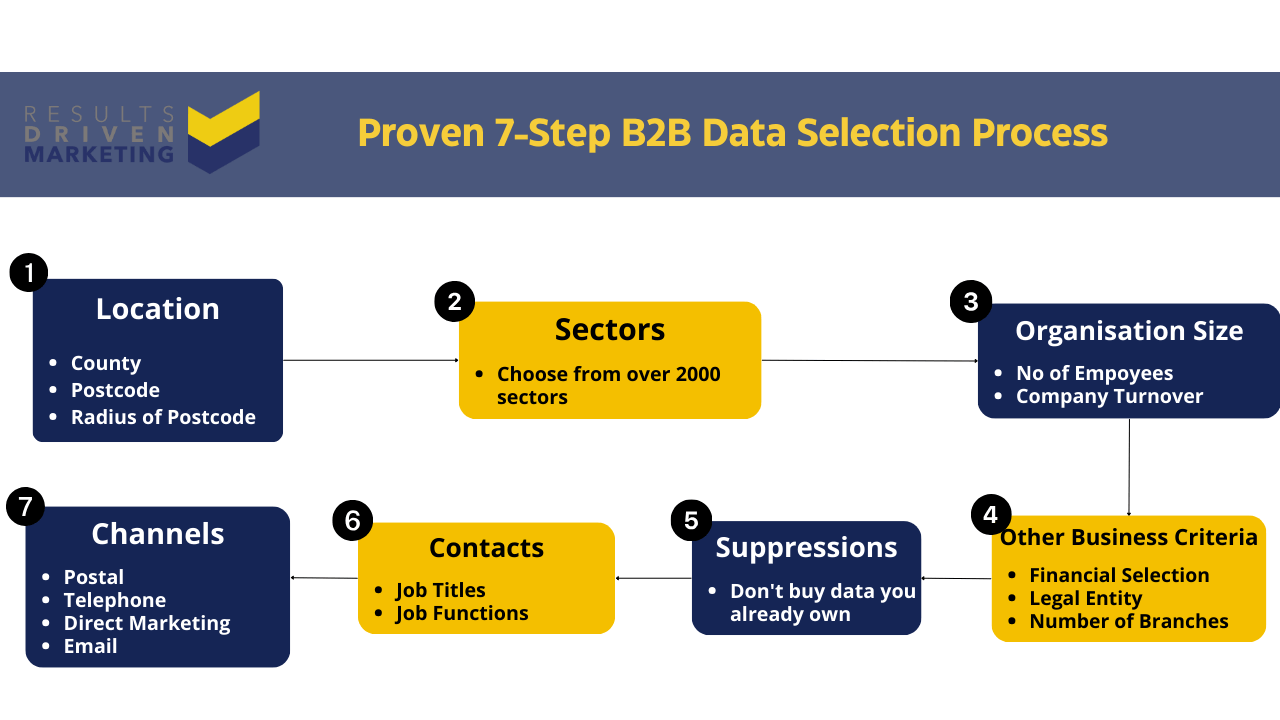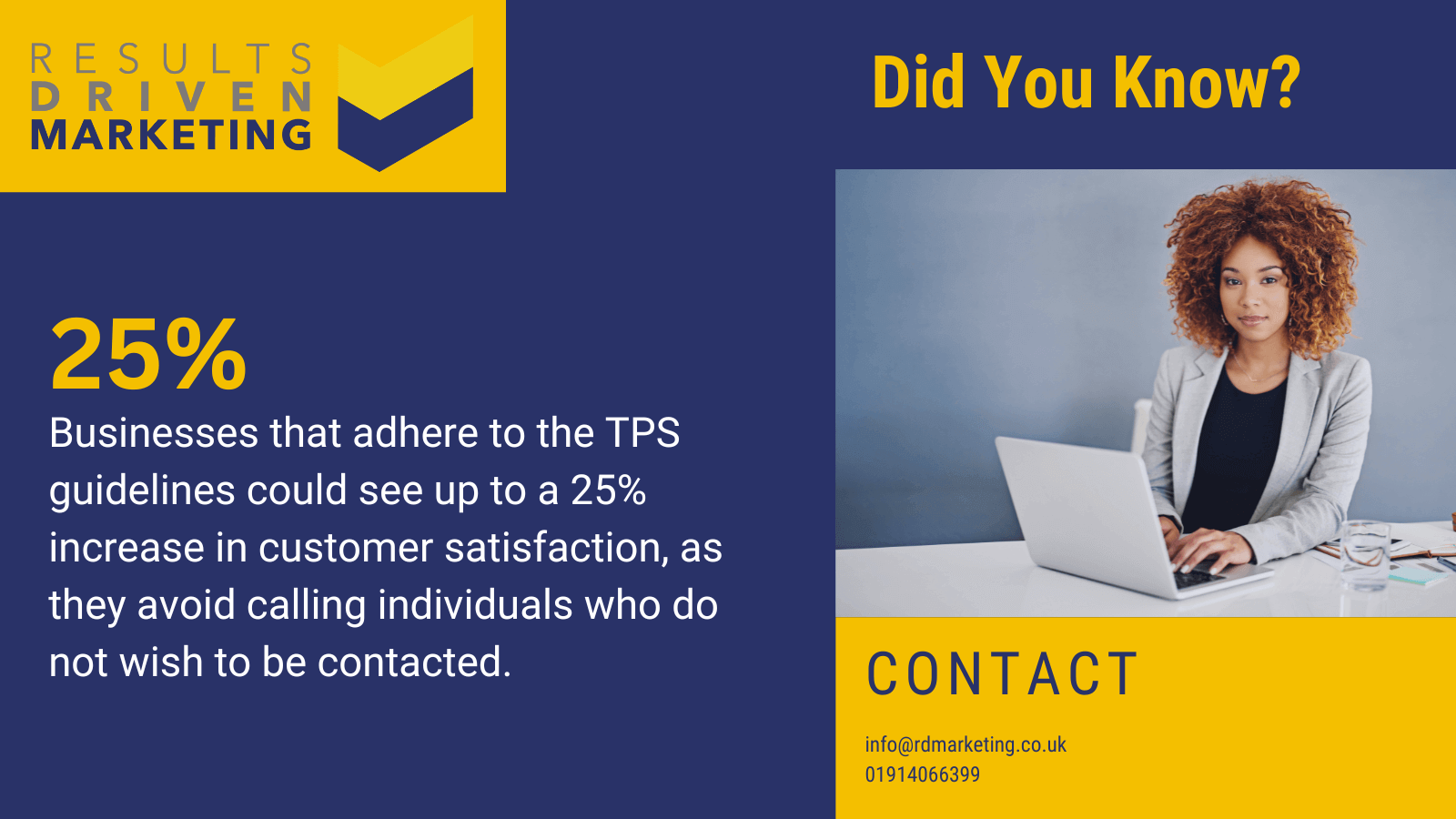
Telephone Preference Service: What it is & Why it’s Vital For Your Marketing
The Telephone Preference Service (TPS) is a crucial safeguard for consumers who want to avoid unwanted marketing calls. For any business or marketer running telemarketing campaigns, understanding the Telephone Preference Service and staying compliant with its regulations isn’t just a good idea—it’s essential.
The TPS is a free service that allows individuals to register their phone numbers to opt-out of unsolicited sales calls. This registry is legally binding, meaning companies must respect these preferences or face hefty fines and penalties.
For businesses, the Telephone Preference Service is more than just a regulatory hurdle. It’s a way to build trust and credibility with customers, demonstrating that your company values consumer privacy.
By ensuring that your telemarketing data complies with TPS, you avoid potential fines and also improve your overall customer relations. After all, customers are far more likely to engage with brands that respect their privacy.
Moreover, being TPS-compliant helps companies like yours avoid unnecessary risks. For businesses that work with telemarketing or direct mail campaigns, ensuring that you follow TPS regulations is not just a matter of legal compliance—it’s also a strategic advantage.
If you’re looking to ensure your data is fully compliant, our CTPS Checker is an excellent tool to ensure you’re adhering to all necessary guidelines.
By understanding and respecting the Telephone Preference Service, businesses can protect themselves legally, build trust, and maintain a clean, reliable B2B telemarketing list.
Table of contents:
What is the Telephone Preference Service (TPS)?
The Telephone Preference Service (TPS) is a UK-based registry designed to help consumers opt out of unsolicited sales and marketing calls.
It’s a free service managed by the Direct Marketing Association (DMA), allowing individuals and businesses to register their telephone numbers, so they are legally protected from receiving unwanted calls. The TPS has become an integral part of responsible marketing practices, ensuring that consumers can safeguard their privacy, while businesses remain compliant with UK regulations.
Once a phone number is registered on the Telephone Preference Service, marketers are legally required to avoid calling that number. Failing to comply can lead to penalties from regulators like the Information Commissioner’s Office (ICO).
For businesses that rely heavily on telemarketing, ensuring compliance with TPS is not just about avoiding fines; it’s also about maintaining a positive reputation in a consumer-focused market. If your business relies on telemarketing, it’s essential to check if your data is TPS compliant. Our data cleansing services can help you ensure your lists are up-to-date and fully compliant.
TPS vs. Corporate Telephone Preference Service (CTPS)
While the TPS is aimed at individuals, there’s also a Corporate Telephone Preference Service (CTPS), which works in much the same way but is designed for businesses that do not wish to receive unsolicited sales calls.
Just like the TPS, businesses registered on the CTPS are protected by law, and telemarketers are legally obligated to avoid calling them. This is a key distinction that businesses engaged in B2B telemarketing must be aware of. Our CTPS Checker can assist in making sure your telemarketing campaigns only reach compliant contacts.
How TPS is Regulated in the UK
Compliance with the Telephone Preference Service isn’t just a recommendation—it’s a legal requirement under UK regulations such as the Privacy and Electronic Communications Regulations (PECR) and General Data Protection Regulation (GDPR).
These laws govern how businesses can engage with consumers and emphasise the need for explicit consent before making marketing calls. Ignoring TPS can result in hefty fines, as the Information Commissioner’s Office (ICO) actively enforces these regulations.
For any business conducting telemarketing, ensuring you comply with GDPR, PECR, and the TPS is essential for avoiding legal repercussions. If you’re unsure about the state of your telemarketing data, our data enrichment services can help verify and enhance your contact lists.
Who Should Register?
Both individuals and businesses can register their numbers with the Telephone Preference Service. If you’re an individual looking to avoid unwanted calls, registering with the TPS is free and can be done in a matter of minutes.
On the other hand, businesses that rely on telemarketing must take proactive steps to check that their contact lists do not include numbers registered with TPS or CTPS. It’s always a good idea to ensure that your B2B telemarketing strategies respect these preferences and regulations.
To purchase fully compliant telemarketing data, check out our selection of B2B telemarketing data and direct mail data for your campaigns. This will not only help you stay compliant but also improve your marketing performance by reaching the right people.
Legal Implications of Ignoring the Telephone Preference Service (TPS)
Failing to comply with the Telephone Preference Service (TPS) guidelines can have significant legal consequences for businesses. Companies that continue to make unsolicited marketing calls to individuals or businesses registered with TPS or Corporate Telephone Preference Service (CTPS) are subject to penalties enforced by regulatory bodies such as Ofcom and the Information Commissioner’s Office (ICO).
The TPS is not just a guideline—it’s a legal requirement, and non-compliance can be costly in terms of both fines and damage to your business reputation.
Fines and Penalties for Non-Compliance
If your business disregards the Telephone Preference Service, you’re putting yourself at risk of severe fines. The ICO has the authority to impose financial penalties of up to £500,000 for serious breaches of marketing regulations.
Companies that make unsolicited calls to individuals registered with TPS can expect to receive substantial fines, especially if they ignore repeated warnings. The penalties scale depending on the severity of the infraction, with some businesses being fined tens of thousands of pounds for a single breach.
For instance, in 2020, a UK-based company was fined £220,000 for making thousands of illegal marketing calls to people registered with the Telephone Preference Service. This shows just how serious the repercussions can be.
These penalties aren’t just a slap on the wrist—they can cripple small businesses and create significant financial strain for larger companies. If you’re using telemarketing data, it’s crucial to ensure that your contact lists are TPS-compliant. Our data cleansing services are designed to help you remove any non-compliant numbers from your lists to avoid hefty fines.
Regulatory Bodies Enforcing TPS Laws
Two key regulatory bodies are responsible for ensuring that businesses comply with the Telephone Preference Service: Ofcom and the ICO.
- Ofcom is responsible for regulating communication services in the UK. While they primarily focus on technical aspects, they do monitor telemarketing practices and help enforce the TPS.
- ICO handles the data protection side of things, ensuring that companies follow privacy laws such as GDPR and PECR. The ICO enforces penalties for breaches and issues fines for non-compliance with TPS regulations.
Both organisations work together to ensure that businesses respect consumer privacy and do not breach marketing rules. Any company conducting B2B telemarketing or direct-to-consumer marketing must be mindful of these regulations.
If you’re uncertain about the compliance status of your data, our data enrichment services can help ensure that your lists meet all legal requirements.
Real-Life Examples of Companies Fined for Violating TPS Regulations
There have been numerous high-profile cases where companies have been fined for violating Telephone Preference Service regulations.
For example, a large UK-based home improvement company was fined £180,000 for making over one million marketing calls to TPS-registered individuals. In another instance, a financial services firm received a £75,000 fine for targeting individuals on the TPS list.
These real-world examples serve as a reminder that no business, regardless of its size, is immune to the penalties associated with non-compliance.
Even if your marketing campaigns are producing results, a fine of this magnitude can wipe out your profits, making it crucial to ensure your marketing practices are aligned with TPS requirements. Businesses that invest in telemarketing data should consider regularly using tools like our CTPS Checker to keep their data updated and compliant.
Legal Best Practices for Businesses
To avoid legal pitfalls, it’s essential for businesses to follow best practices when using telemarketing data. Here are some key steps to take:
Regularly check your data: Ensure that the numbers you’re calling are not registered with TPS or CTPS by regularly cleaning and updating your data. You can use our data enrichment or data cleansing services to help keep your lists in line with compliance standards.
Gain explicit consent: Always seek explicit consent from individuals before adding them to your marketing list. This is crucial under GDPR and PECR.
Monitor compliance: Use services like our CTPS Checker to verify that you are not contacting numbers that are registered with TPS or CTPS.
Keep records: Always maintain detailed records of who you are contacting and ensure that you have consent to reach them. This is vital if a complaint is raised.
By following these legal best practices, your business can avoid the costly consequences of non-compliance while maintaining a positive relationship with your audience.
Why TPS Compliance is Vital for Responsible Marketing
In today’s marketing world, TPS compliance isn’t just about ticking boxes to avoid fines—it’s about demonstrating a commitment to ethical and responsible marketing. Adhering to the Telephone Preference Service (TPS) guidelines means respecting consumer privacy, which is vital for building long-term trust and fostering strong relationships.
Responsible businesses understand that consumers want to feel in control of how they are contacted, and complying with TPS rules is one of the best ways to ensure that trust is maintained.
Building Consumer Trust Through Responsible Marketing
When businesses take the extra step to comply with the Telephone Preference Service, it sends a clear message: “We respect your privacy and preferences.” Customers are increasingly wary of brands that invade their personal space with unwanted calls or communications.
By ensuring that your telemarketing data and marketing lists are TPS-compliant, you are not only avoiding legal trouble but also gaining customer loyalty. People want to engage with brands they can trust, and adhering to TPS builds that trust.
Companies that work with direct mail data or email address lists should regularly audit their data to ensure compliance. Our data enrichment services can help you keep your lists up-to-date and ensure that you’re contacting only those who have opted in to receive your communications. This leads to more efficient marketing and better consumer relationships.
Impact of Non-Compliance on Brand Reputation
The consequences of ignoring TPS regulations go beyond just fines and legal trouble. Non-compliance can severely tarnish your brand’s reputation.
Think about it: if a business continues to make unsolicited calls despite being required to comply with TPS, it risks being labeled as invasive and disrespectful to customer preferences. Once that trust is broken, it’s incredibly difficult to rebuild.
Imagine how much damage could be done if your brand becomes associated with ignoring consumer rights. Even if you aren’t hit with an ICO fine, the impact on your brand’s reputation could result in lost sales, negative reviews, and reduced customer retention.
Businesses that rely heavily on B2B telemarketing data can avoid this pitfall by investing in solutions like our CTPS Checker, ensuring they never reach out to the wrong contacts.
Ethical Marketing: Protecting Consumer Rights
Ethical marketing means prioritising the customer’s right to privacy. The Telephone Preference Service was created to protect individuals from unsolicited calls, and businesses that take compliance seriously demonstrate their commitment to this.
By respecting the TPS guidelines, you’re aligning your marketing efforts with consumer rights, which is increasingly important in a world where privacy concerns are at an all-time high.
Moreover, ethical marketing is about more than just playing by the rules—it’s about building a business that values its customers.
Offering services like email marketing management that are compliant with consumer protection laws is not just about compliance, it’s about giving your audience the best possible experience. We offer email marketing management services to help businesses implement strategies that respect consumer rights while still achieving their goals.
Long-Term Benefits of Following TPS Regulations
Complying with the Telephone Preference Service isn’t just about avoiding immediate penalties. In the long run, it helps create a more sustainable business by fostering customer retention and reducing churn.
When customers know that your business respects their preferences, they’re more likely to stay loyal and recommend your brand to others. Following TPS regulations ultimately creates a foundation for long-term success.
Moreover, businesses that adhere to TPS rules often see better marketing performance. By targeting only those who have opted in, your marketing efforts become more efficient, yielding higher response rates and better returns on investment. If you’re looking to streamline your marketing data, our consumer data services offer solutions that are TPS-compliant and tailored to your needs.
In summary, TPS compliance is about more than just following the law—it’s about acting responsibly, protecting consumer rights, and building a trustworthy brand. By incorporating ethical marketing practices, your business will not only avoid legal trouble but also strengthen its position in the market. And if you’re ever in doubt, our data cleansing services can help you stay fully compliant while ensuring your data is accurate and up-to-date.
How to Register and Use the Telephone Preference Service (Step-by-Step Guide)
If you’re looking to ensure your marketing efforts are both responsible and compliant, registering with the Telephone Preference Service (TPS) is essential. Whether you’re an individual trying to avoid unsolicited sales calls or a business safeguarding its marketing practices, the process is straightforward. Below, we’ll walk you through how to register for the TPS, how to check if a number is listed, and how to stay compliant when using third-party telemarketing data.
How to Register for TPS (Individuals & Businesses)
For Individuals: If you’re an individual looking to stop receiving unsolicited marketing calls, registering with the TPS is quick, easy, and free. Here’s how to do it:
- Visit the official TPS website or call their registration hotline.
- Provide your telephone number, including both landline and mobile numbers, if applicable.
- Registration typically takes up to 28 days to become fully active, after which marketing calls should stop.
For Businesses: Businesses can also register with the Corporate Telephone Preference Service (CTPS) to avoid unwanted marketing calls. This service works similarly to TPS but is tailored for corporate telephone numbers.
- Visit the official CTPS site or use our CTPS Checker to quickly verify your compliance.
- Enter your corporate number and follow the same simple steps as individuals.
Once registered, businesses are legally required to refrain from making marketing calls to numbers listed on the TPS or CTPS databases.
How to Access and Check the TPS List
After you’ve registered, or if you’re a marketer looking to avoid calling TPS-registered numbers, it’s important to check the TPS database before launching any campaigns. Here’s how:
- Access the TPS database: You can subscribe to the TPS service, which will provide you with the ability to download a list of numbers that should not be contacted.
- Use verification tools: Our data cleansing services can help you check and remove any TPS-registered numbers from your telemarketing lists, ensuring you stay compliant.
- Update regularly: Always check your lists before each campaign to ensure they are compliant. The TPS list is updated regularly, so staying up-to-date is critical.
Verifying Telemarketing Data and Keeping Records
When working with B2B telemarketing data, or using third-party lists, verifying that your data is TPS-compliant is crucial. Here’s how you can stay on top of it:
- Regular data checks: Use our data enrichment services to keep your data accurate and up-to-date. This service ensures your marketing lists are cleaned and verified before any outreach.
- Keep detailed records: Document all consent given by individuals or businesses, and keep track of when TPS checks are performed. This not only ensures compliance but also protects your business if any disputes arise.
- Check third-party data: If you purchase telemarketing or international email lists, make sure the vendor has verified that the data is TPS-compliant.
By following these steps, businesses can avoid legal pitfalls and maintain a healthy, compliant marketing operation. Whether you need direct mail data or robust consumer data, ensuring compliance with the Telephone Preference Service is the best way to build trust and protect your brand.
TPS and Modern Marketing Strategies: Balancing Compliance and Growth
Adapting to Telephone Preference Service (TPS) regulations doesn’t mean your marketing efforts have to slow down. In fact, balancing TPS compliance with growth can lead to smarter, more effective marketing strategies that respect consumer privacy while delivering strong results.
The key lies in combining responsible telemarketing with innovative, modern alternatives like email marketing, social media, and inbound marketing.
Data Cleansing Techniques to Ensure TPS Compliance
One of the first steps any business should take is regularly cleaning its telemarketing data to ensure compliance with the Telephone Preference Service.
This helps you avoid contacting individuals or businesses that have opted out, keeping you legally compliant and maintaining trust with your audience. Data cleansing involves reviewing your lists and removing numbers that are registered with TPS or Corporate Telephone Preference Service (CTPS).
Here’s how you can streamline your data cleansing process:
- Automated data checks: Use tools like our data cleansing services to quickly remove non-compliant numbers from your lists. This ensures you’re always working with accurate and TPS-compliant data.
- Regular audits: Even if you’ve done an initial cleanse, it’s crucial to continuously audit your marketing lists. The TPS database is updated regularly, and frequent checks will ensure ongoing compliance.
- Utilise CTPS verification: If you’re targeting businesses, make sure you’re using a CTPS Checker to prevent reaching out to corporate numbers that have opted out.
Alternatives to Telemarketing: Email, Social Media, and Inbound Strategies
While telemarketing remains a powerful tool, it’s not the only way to engage your audience, especially in a world where TPS compliance limits who you can call. Exploring alternative marketing channels can open new doors for growth while still adhering to TPS regulations.
- Email marketing: With the right email address list data, email marketing can be just as effective as telemarketing—if not more so. By targeting opt-in email lists, you can reach customers who have already shown interest in your brand, leading to better engagement and conversion rates.
- Social media marketing: Platforms like Facebook, LinkedIn, and Instagram allow businesses to run highly targeted ads without needing a phone number or other personal data. It’s a great way to engage a broader audience without risking TPS non-compliance.
- Inbound marketing: Instead of reaching out to potential customers through cold calls, focus on creating valuable content that draws them in. Strategies like SEO, blogging, and content creation attract leads to your website naturally, reducing the need for outbound marketing altogether.
Our email marketing management services are designed to help you execute high-performing email campaigns that drive results while respecting data protection regulations.
Best Practices for Outbound Marketing Campaigns in a TPS-Compliant World
When running outbound marketing campaigns, it’s essential to adapt your strategies to respect TPS regulations while still driving growth. Here are a few best practices to follow:
- Target opt-in lists only: Focus your outbound efforts on contacts who have explicitly consented to be contacted. This can include using B2B data that has already been verified for compliance.
- Segment your audience: Narrow down your target lists to those most likely to engage with your message, ensuring your outreach is both legal and effective.
- Stay transparent: Ensure that any contacts who are reached through outbound efforts clearly understand who is calling and why. Always provide opt-out options for future communications.
For businesses looking to maintain efficient telemarketing campaigns, investing in TPS-compliant telemarketing data is a must. Our B2B telemarketing data solutions help you reach the right audience while staying on the right side of the law.
How to Optimise Telemarketing Campaigns Post-TPS Compliance
Even with TPS compliance, telemarketing can still be a highly effective strategy. The key is to focus on optimising your campaigns for efficiency and legal adherence. Here’s how:
- Focus on high-quality leads: Use verified, TPS-compliant data to ensure your telemarketing efforts are reaching individuals who are likely to engage. Our international email list services can help you target global audiences with confidence.
- Combine with multi-channel efforts: Instead of relying solely on telemarketing, create integrated campaigns that combine phone calls with email, social media, and content marketing. This diversification helps to balance compliance with a broader outreach strategy.
By incorporating these strategies and leveraging services like consumer data and direct mail data, your business can continue to grow while maintaining full compliance with the Telephone Preference Service.
Hence….
In conclusion, adhering to the Telephone Preference Service (TPS) is not just a legal necessity—it’s a smart business move. Compliance with TPS regulations safeguards businesses from costly penalties and ensures that your marketing efforts are both responsible and respectful of consumer privacy. By following TPS rules, companies can avoid legal pitfalls, enhance their brand reputation, and build lasting relationships with customers based on trust.
For marketers, TPS compliance opens the door to more targeted, efficient campaigns that focus on individuals who genuinely want to engage with your business.
Whether you’re cleaning up your telemarketing lists or exploring alternative marketing channels like email and social media, embracing TPS guidelines is crucial for long-term success. Our range of services, from B2B telemarketing data to data cleansing services, ensures that your business stays compliant and thrives in a privacy-conscious world.
Staying on top of Telephone Preference Service regulations will not only protect your business but also position it as a leader in ethical marketing practices. For a complete solution to your data needs, explore our offerings like consumer data or international email lists to fuel your next compliant marketing campaign.
Who are we?
Thinking about “how do I buy data“?
Providing b2b database solutions is our passion.
Offering a consultancy service prior to purchase, our advisors always aim to supply a database that meets your specific marketing needs, exactly.
We also supply email marketing solutions with our email marketing platform and email automation software.
Results Driven Marketing have the best data of email lists for your networking solutions as well as direct mailing lists & telemarketing data in telemarketing lists
We provide data cleansing and data enrichment services to make sure you get the best data quality.
We provide email marketing lists and an international email list for your business needs.
At RDM We provide b2c data as we have connections with the best b2c data brokers.
A good quality b2b database is the heartbeat of any direct marketing campaign…
It makes sense to ensure you have access to the best!
Call us today on 0191 406 6399 to discuss your specific needs.
Results Driven Marketing
0191 406 6399








